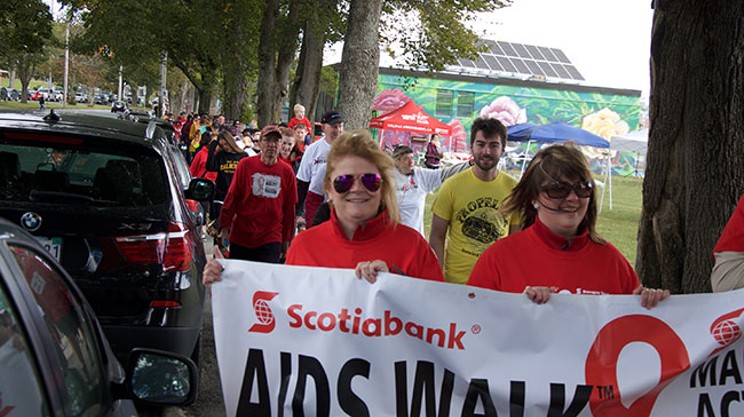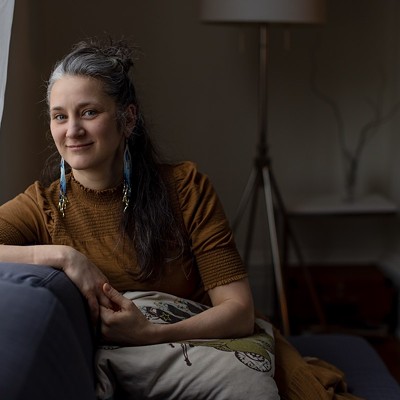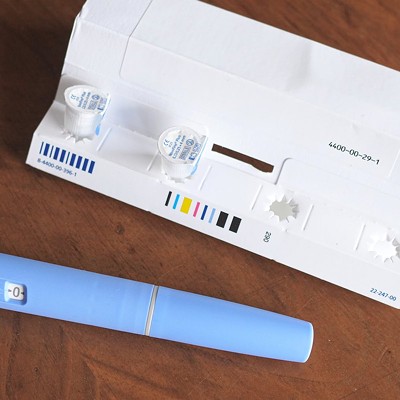Debra Mann’s house is tidy. Not only tidy, either, but clean. She says she thought, “Oh my god,” just before I arrived at her Halifax condo, “there’s dust on the coffee table. I forgot to dust the coffee table.” But if there is dust there, it’s invisible to the naked eye, just like the human immunodeficiency virus that’s been hanging around in Debra Mann’s body for more than half of this 41-year-old’s life.
There is something, though, that can be seen. And it stands out in this two-bedroom pool-view condo, among the orderly knick-knacks, vacuum cleaner-lined carpet and dish-free sink: a full bag of garbage sitting slouched against the cabinets on the white vinyl kitchen floor.
I sit down. She makes tea. We start to talk. Then we’re silent, heads up like small forest animals listening to decipher the snap of nearby branches, as the garbage bag slowly sags and then slumps to the floor on the other side of the half-wall separating the kitchen from the dining area where we’re sitting.
Mann rolls her eyes and huffs as she drops her shoulders in exasperation. Her son Stephen was supposed take it out.
“I thought he might be a bit more compassionate about taking out the garbage,” she laughs about her 15-year-old son. “But there it is. It’s been sitting there for two days.”
Mann has been HIV positive for 22 years, since 1984, when she was a-straight-outta-high-school, high-banged, blond-haired 18-year-old living outside Truro, Nova Scotia.
But the timing’s just a guess, really. She was diagnosed 15 years ago and they—the great vague medical establishment they—speculate Mann was positive for seven or eight years before that. She got her diagnosis when her son Stephen was at the age where babies discover their hands and develop the ability to grab things.
Stephen is a big part of his mom’s story, though he hasn’t always known it. Stephen only found out Debra is HIV-positive last month. “He’s still a brat,” she smiles.
Humour is a part of this story too. Mann’s laughter is irrepressible, infectious; her joking never quits. As I step inside her front door, slip off my shoes and small-talk my way through the empty air between our introduction and the formal interview, I point out an odd sight—a hearse parked in the condo lot. Without missing a beat, Mann cocks her head in false sadness, “Oh, and you thought the interview was cancelled!”
And that is the way of Debra Mann. She is hilarious and young-looking and normal-looking, if there is such a thing—she’s blond and tanned and fit and 41. Almost 42. And you might know her, because Debra Mann isn’t her real name. And that’s all for the benefit of her son (Stephen isn’t his real name).
When Stephen was in daycare—one year old and getting to be the size of other one-year-olds, finally, because he was a tiny baby—the daycare owner found out his mom was HIV-positive and kicked Stephen out of the centre. This was in 1992 in Halifax. It was one of Mann’s first tastes of the stigma that dogs PHAs (that’s the current acronym; it stands for Persons with HIV/AIDS). “I knew right then,” she says, “oh my gosh, I better not tell anybody.”
I know what you’re thinking, if you know anything about HIV transmission or the legal protections afforded PHAs in Nova Scotia: they can’t do that. They can’t do that.
“Their fear was not that he was positive, but that eventually he would be. And he would put them all at risk,” she says. “But I was so sick. I just didn’t have the strength to go there. I was still dealing with the diagnosis. And the shock and the fear…so, yeah, they could do that.”
There have been other incidents. Mann next put Stephen in private daycare and the same thing happened. Doctors, early on, always asked her questions about her sexual partners and IV drug use. They made false assumptions about her lifestyle based on her positive status. A fellow condo owner, now moved, left Mann an anonymous note in her foyer: “You’ve got AIDS. You’re going to die soon.” And, Mann says, she hears “crazy things” all the time. A few weeks ago she met a fellow PHA who was having trouble getting a cat-sitter because the cat had bit her, and the person who was supposed to take the cat thought the HIV-laced blood might still be in its mouth.
Mann had her own misconceptions too, way back when. “The first year I went to the AIDS coalition,” she says, “I wouldn’t touch anything. I was like, oh my god, what am I going to get here? And then it was like, hello? You’ve already got it, Debra.”
Mann knew about AIDS, of course. She remembers reading about Janet Connors—the Dartmouth, Nova Scotia, woman who contracted HIV from her husband, a hemophiliac, and who fought for financial compensation and recognition of Canada’s “tainted blood scandal.” But really, it came down to one thing: it was a gay man’s disease and it wasn’t her concern. She had a vague notion that HIV was passed by gay men who, during anal sex, got feces in their urethras.
In the early ’80s, she says, “We were educated, yeah: go on the birth control pill. That’s your form of protection.”
She thinks the message about AIDS could have been better disseminated in the early years, but she doesn’t feel blame. “Who can I be angry with?” she says. “I had sex. I wasn’t forced into it.”
The world Mann grew up into and the one into which her son Stephen has come of age are much different. The worldwide infection rate when Mann was diagnosed in 1991 was estimated to be just shy of 11 million people. Today, it nears 36.8 million. The good news is, Mann says, half-seriously, her son “knows more about it than she does.” He’s learned about it in school.
Still, she kept her status from him. “I never wanted him to know, in fear of him telling a friend and then the whole school finds out and then he has to feel what I have felt.”
More than that though—because, Mann admits, much of the stigma she’s experienced has dissolved over the years—she was a chickenshit (and that’s her word). “As he got older, I started getting healthier and healthier with the new meds. And his father and I had separated and teenage years are really blah and I just always thought, you know what? He doesn’t need this.”
All through her pregnancy with Stephen, Debra Mann was losing weight. She had a recurrent case of thrush—a yeast infection with a tell-tale white bumpy coating—all over her mouth, too, which continued to dog her after Stephen’s birth. Mann was sent to a mouth specialist. “He kind of leaned back and said, ‘Can I take a picture of your mouth?’ And I said, go ahead, just give me something for this. It’s embarrassing. So he took the picture and he said, ‘You’ve got AIDS.’”
“Are you insane?”
That night, Mann remembers, “I was sitting in the tub reading this magazine. You remember Arthur Ashe”—the Wimbledon-winning American tennis player who contracted HIV through a blood transfusion and died in 1993. “It was just when he came out with it and in the first paragraph he had thrush in his mouth. And I thought, oh fuck. Oh fuck. I’ve got this.”
Mann went to her regular doctor, who told her the mouth specialist was crazy. “I birthed your child and you do not have AIDS! You do not have AIDS!” he told her. “We’re suing that guy!”
She got tested instead.
Before the results came back from the lab, Mann was in the hospital with pneumocystis pneumonia, a rare and deadly lung infection. (It’s so bad that in most cases I would instead be writing here: Before the results came back from the lab, Mann was already on her death bed.)
Wondering how she got HIV? So was she.
She wasn’t a gay man. She had never had a blood transfusion. She didn’t use drugs. No one she knew knew anything about this disease. When Mann’s grandmother was told of her granddaughter’s diagnosis, she said, “What do you mean she’s got EGGS!?”
Early on, Mann’s mom used to come visit her with a mask on. “To this day,” Mann says, “if you ask her, I got this from a dentist. That just made it easier for her to accept. And it still does.”
How Mann contracted HIV is shocking, if only in its mundaneness: “I had sex with my husband.”
The mundaneness only increases by degree if you’re wondering how Mann’s husband got it. Clandestine bisexual? A secret intravenous drug user? Not even close.
Tattooing.
“The research was that there were quite a few people who had contracted HIV through this specific tattoo parlour,” she says.
So there she was: 27 and with a brand new baby at home, lying in a room on the eighth floor “AIDS ward” at the Victoria General Hospital in Halifax. She refused to sleep, because if you were there, you knew, and everybody else knew, you were dying. And if she went to sleep, she just knew she was going to die. A nurse came into her room one night, closed the curtains around her bed and sat down. He said, “I’m living with HIV and you’re going to be fine.”
Family and friends took care of Stephen. Mann’s husband wasn’t sick and he was busy working, trying to keep the family going, at least financially.
Numbers are important when you’re HIV-positive. PHAs have regular bloodwork to determine viral load (how much HIV is in your system) and T-cell or CD4 counts (which indicates immune system strength).
When Debra Mann was diagnosed, there wasn’t even a test, yet, to measure viral load. But she knows her first T-cell count. It was eight. A normal count is at least 500, and can be as high as 1,500. In lay terms, she had no immune system left.
She went on AIDS medication immediately. AZT first, but that made her anaemic so she couldn’t stay on it; another drug after that, she doesn’t remember which one; then when that one outlived its usefulness and there were no options left, Health Canada approved a compassionate release application for her to go on trial drugs.
There’s a part in Milan Kundera’s novel The Book of Laughter and Forgetting in which one protagonist leaves the pages of her diary blank on the most memorable days of her life, because those, of all days, she will remember. But later, those are the days she forgets. It’s like this for Debra Mann.
Mann’s days of deepest sickness—and she was in and out of the hospital for years—are a haze. “It’s like looking at someone else’s life,” she says, and it’s the only time she loses her crackly wit, instead she shakes her head sadly. “Most people have a certain number of years to get used to it before they get sick. I was already there. And that’s back there. It’s another life now. I don’t dwell on it.”
She doesn’t talk about it either. Except for this part.
Mann was sent home from palliative care around 1995. There were no drugs left for her to take. She was sent home to die. Stephen, now a pre-schooler, was staying with relatives. “I was sleeping on the couch because I couldn’t get out of bed. The sun was just coming up. It was about five or six in the morning. And I was facing the picture window in the living room and there was just a shadow. There was this shadow there and there was no face to it. And it said, ‘You’re going to be OK.’ And I said, yeah, I know.”
She weighed, maybe, 85 pounds and, she says, “I just started making myself get up.”
Today she’s 144 pounds. Her viral load is undetectable (it’s a crucial word to hear when you’re HIV-positive, though it doesn’t mean the virus is gone). “I just got my T-cell count yesterday. I’m great. I’m 900. I probably have more than you right now.” She laughs, “Would you like some?”
So Debra Mann gets to own a story few of us ever will, a tale of being about as close to death as you can get, only to come back.
The shape in the living room picture window tells her she’s going to be OK and she spits back—with attitude, no less—that, duh, she already knows that. And she gets up off the couch. And she does it again the next day. And she keeps making herself do it.
She moves from Boost milkshakes to real food. She goes on methadone for six months to wean off the morphine she became dependent on during what would have been the end of her life. She tries to train herself not to vomit when Stephen jumps on her bed. She takes Gravol for 10 years. She begins receiving long-term disability from Canada Pension and finally returns to her marriage and her life.
Ties up nicely, huh? A heartrending tale with a happy finale. But there’s more to go. And if Hollywood endings are your preference, feel free to stop reading here.
Stephen comes home from school for lunch last month, like normal, and when he’s kneeling to the floor to tie one of his sneakers to go back out the door he looks up at Debra and says, “Do you have AIDS?”
“Why are you asking me that?”
“I want to know.”
“I do, Stephen. Do you want to talk about it?”
“No.”
And in the time it takes to tie a pair of sneakers, a lifetime—literally a lifetime, Stephen’s lifetime—of hiding a secret comes undone. “I wasn’t going to lie,” Mann says.
“I don’t know how he suspected. Maybe the medication. Maybe the fact that I drag him to all the AIDS things with me.” (Mann has been a volunteer with the AIDS Coalition of Nova Scotia for years.)
“I tried to expose him, all his life, to all of that so when it came time for me to tell him it wouldn’t be so, like, oh, my mother’s dying. I wanted him to see normal lives.”
When Stephen came home after school that day he only had two questions.
“Do I have it?”
No.
“How’d you get it?”
And you already know the answer to that. Debra got it from her husband. So she was left with the job of telling her son that not one, but two of his parents are HIV-positive. He walked into his bedroom.
Debra’s ex-husband came over to take Stephen out to dinner that night, but he didn’t want to talk about it. A month later, still nothing. “It’s how we do things in our family,” she says. “If you ignore it, it WILL go away.”
It’s a common enough coping strategy. So common, you probably know it’s bullshit. And, of course, Mann knows too.
“I’m going to die of this,” she says. “Some nights I go to bed and I think, oh my gosh, oh my gosh. It’s going to happen. And I get really down. Certain things set me off. Christmas. Mmm…”
There’s a balance, though, between knowing what will likely kill you and still having to actually live—to do the dishes and your taxes and bug your kid to take out the trash.
“It’s funny,” she says. “It’s not that I forget I have it. I can’t. It’s changed my lifestyle completely. But it’s not part of me.”
Have you heard of spoon theory, she asks?
Pretend I’m giving you a bunch of spoons, Mann says, as she mimes it, like she’s passing over a $10 grocery store bouquet of daisies.
“Now what do you do in the run of a day?”
“I get up.”
She takes away one imaginary spoon.
“I take a shower.”
She takes another spoon.
I make breakfast; she takes another.
I brush my teeth; I clean the kitchen; I check my email.
Another; another; another.
By lunchtime, all my spoons are gone.
“Now,” she says, “your day is finished. And that is my life”
Mann says she lives like a 75-year-old. “No,” she corrects herself. “An 85-year-old. I am all schedules.
“After supper I have to wait a good hour-and-a-half before I can go for a walk because everything just runs right through me. I can’t get on public transit. The smell and the fumes make me sick. I can get halfway to Sobeys and have to come back home and go back in a couple of days. I’ve lost all my muscle. My energy is gone. I have irritable bowel. I sleep four hours every afternoon.”
And oy, there’s the rub. Because on paper, she’s perfect.
Remember those important numbers? T-cell count—900. Viral load—undetectable. “It’s not like I want the counts to come back differently,” she says. “But, everything’s perfect? Well, no, it’s not perfect.”
She dates still, but it’s not easy. Mann always discloses her status when intimacy enters the picture. “It’s cool,” she says, of the times relationships have ended with a false I’ll call you. “If someone doesn’t find me interesting enough, then I don’t want them in my life anyway.”
But she wouldn’t like to find another PHA life partner. She’s been there. She’s been married to the situation. “You know that woman thing? Always taking care of somebody else? It became too stressful. I just couldn’t deal with it anymore,” she says.
So she lives day-by-day, takes her meds, hopes for a cure, waits and wonders as the music swells and the Hollywood ending nears…
Wait. Stop. You didn’t actually buy into that, did you?
“If there was a cure discovered tomorrow,” she says, “I’d probably take a gun and shoot myself in the head.”
“And I know that’s hard for someone to get, but 15 years is a long time to deal with this and build a life around this and I don’t think, emotionally, I’d ever be the same. The best part of my life has been taken. My marriage broke up, I lost my home. I a middle-class income. It’s not that I had a lot of expectations in my life, but whatever there was has already been taken away.”
“I used to meet people who said, ‘Oh,” and Debra Mann’s torso is swaying here, her voice mock-dreamy, “since I became positive it’s really changed my life, it’s been so beneficial. I really look around. I’m focused. I love beauty.’ And I think, fuck you. I enjoyed all that before this disease came.”
So if it’s not a Hollywood ending, here, what is it? It’s unresolved. And more that that: irresolvable. Debra Mann’s situation is contradiction incarnate. It’s dealing with this virus every minute of every day, but almost in the subconscious. It’s planning her daily schedule around nausea that may or may not come; it’s remembering to take her pills. It’s a sighing hope that a 15-year-old will finally take out the trash before she trips on it making supper.
“I survive by being positive,” she says. “I want you to look at me as a normal, healthy, person. Same as you. And that’s where the contradictions come in. Because it’s a façade. So this will never end on a positive note. There’s only accepting it. And that’s not positive,” she says. “It’s all just the cards you were dealt.”
Lezlie Lowe is a freelance writer living in Halifax. This profile is the first in a series of three.




















